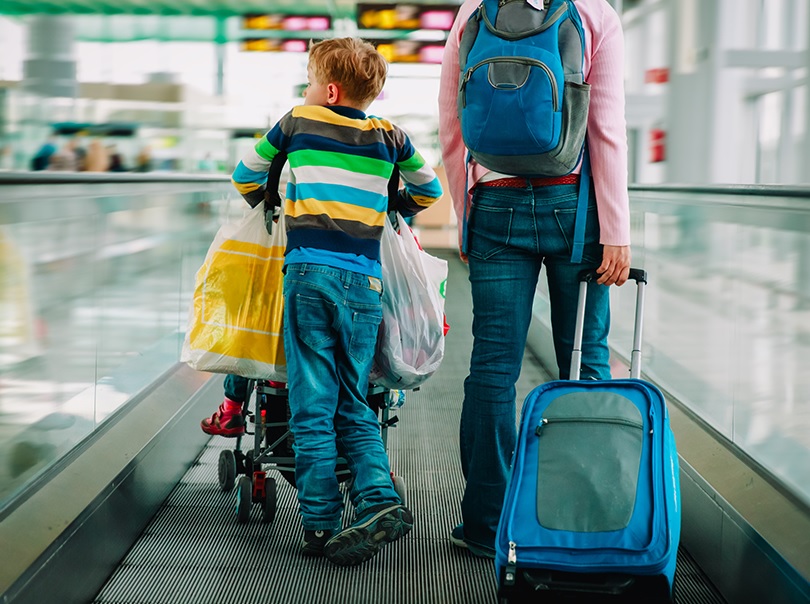
Relocating overseas
 The Appeal Court of the Family considered an appeal from parenting orders made by a judge of the Family Court of Australia concerning a child who was born in 2011. The mother sought orders for the child to live with her in an overseas Country. The mother’s application was opposed by the father who sought orders for the child to live with him in Australia and spend time with the mother after she relocated.
The Appeal Court of the Family considered an appeal from parenting orders made by a judge of the Family Court of Australia concerning a child who was born in 2011. The mother sought orders for the child to live with her in an overseas Country. The mother’s application was opposed by the father who sought orders for the child to live with him in Australia and spend time with the mother after she relocated.- An Independent Children’s Lawyer (“the ICL”) was appointed and opposed any relocation to the overseas Country but proposed orders that the child continues to live with the mother and spend time with the father.
- The question, therefore, that faced the primary judge was whether the child should live with the mother in the overseas country or in Australia or with the father in Australia.
- Ultimately, the primary judge acceded to the mother’s application and made orders permitting the relocation of the child to the overseas Country. The father appealed those orders. The appeal was supported by the ICL. The father’s appeal was upheld.
BACKGROUND
- The father, aged 42 at the time of the hearing, was an Australian citizen. He met the mother, who was aged 39 at the time of the hearing, on an international dating website in 2009. The mother was then living in the Country where she wished to relocate, where she was born and raised.
- The relationship developed quickly. The mother spent three months in Australia in late 2009 and then returned to live permanently in Australia with the father in 2010. A civil marriage ceremony was conducted in 2010 followed by a religious ceremony in 2011.
- The parties’ only child was born in 2011.
- The parties separated in 2012 when the mother moved into a women’s refuge with the child.
- At the same time, the father was charged by the police with assaulting the mother and for intimidating her earlier in the same year. He pleaded guilty to the second offence and a final Apprehended Domestic Violence Order (“ADVO”) was made for the protection of the mother which remained in force until March 2015.
- In July 2013 orders were made for the child to spend time with the father for three hours per week at the father’s home and supervised by a professional supervision service. That time commenced in August 2013.
 In September 2014 the orders made in July 2013 were varied and provided for the child to spend three hours each Saturday and Sunday with the father. The requirement for supervision remained.
In September 2014 the orders made in July 2013 were varied and provided for the child to spend three hours each Saturday and Sunday with the father. The requirement for supervision remained.- A final hearing was conducted by a judge of the Family Court of Australia in February 2015. His Honour did not accept the mother’s proposal to return to the Country with the child and final orders were made on 26 March 2015 which provided that the child live with the mother in Australia and spend unsupervised time with the father. Orders were also made in relation to parental responsibility, the child’s name, changeovers, and discharging the ICL.
- The mother became an Australian citizen in 2015.
- On 15 September 2015 appeals by both the mother and the father from the orders made on 26 March 2015 were allowed by consent and the matter was remitted for rehearing. The orders made on 26 March 2015 continued as interim orders.
- Further interim orders were made by the primary judge on 16 February 2016 in relation to the child spending time with the father and changeovers. In the following month, the rehearing was expedited. The matter was fixed for a hearing in April 2017, but that date was vacated in February 2017 on the mother’s application. At that time, orders were made preventing the child’s removal from Australia.
- The hearing before the primary judge commenced in April 2018 and concluded in August of that same year. The final parenting orders which are the subject of this appeal were made on 21 December 2018.
What are the factors that must be taken into account when considering a relocation matter or Relocating Overseas?
The welfare of the child is paramount
This is the paramount consideration that must be applied when deciding a child’s parenting and relocating overseas. A child’s welfare overrides the wishes of the mother and of the father.
So how did the Court decide (on relocating overseas) issue?
Neither the ICL nor the mother pointed to evidence that would support a finding that the child was at risk of harm from his father. The Court is bound to conduct a real review of the undisputed evidence of the facts.
On such a review the Court must determine if the child was at a future risk of harm when in the care of the father.
When considering the welfare of a child the Court must consider the effect on the child of a relocation to another Country which would cause the loss of his relationship with the father and the effect on the child of a relocation.
The likely influence of the mother if she were the only parent in the child’s life and the child’s inability to experience the reality of time with his father if he were to relocate overseas must also be considered and whether it is likely the relationship between the two would come to an end.
Would the relocation prevent the child from enjoying any relationship with his father during the remainder of his childhood?
Could the child rekindle his relationship with his father once he reaches adulthood?
All such matters must be considered in relocation matters. The same considerations apply if the father wished to relocate.
Importantly a child receives a significant benefit from having a meaningful relationship with both parents.

Relocation to another Country may enable the child to maintain a close connection with his maternal grandparents, extended maternal family and local community if the mother was to relocate. The mother is likely to be happier and more relaxed in such circumstances, particularly if she re-establishes stable employment. Under such circumstances, the child may adapt well to the separation from his father. Again, these are matters to be considered.
The relevant provisions of the Family Law Act
When considering s 60CC(3) of the Family Law Act 1975 (Cth) considerations must be given to the nature of the child’s relationship with each parent and other significant persons (s 60CC(3)(b)), the likely effect of change in the child’s circumstances (s 60CC(3)(d)) and the practical difficulty or significant expense involved in spending time with and communicating with the other parent (s 60CC(3)(e))
Would the child be deprived of a relationship with his father’s paternal family which would not be to the child’s benefit?
The benefits and detriments to the child on relocation would depend upon the child’s capacity to adapt to the new circumstances in a new country which is currently untested. It may be a significant hurdle for the child to overcome to adjust to his new circumstances and the significance of the loss of his relationship with his father and extended paternal family which a child may enjoy and the loss of the environmental factors that the child is currently used to for example at school, in ex[tra]-curricular activities with friendships and so on.
Need Legal Help?
If you need help, please contact the Brisbane Family lawyers team at James Noble Law today for a FREE, no-obligation 20-minute consultation. To schedule an appointment with one of our Qualified and experienced Family lawyers Brisbane.
Find Brisbane family lawyers on Google Maps near you.
Helpful Family Law Documents & Guides
- A Guide to Children Negotiation and Family Law
- A Guide to Property & Family Law Act Paper
- A Guide to Alternative Dispute Resolutions
- A Guide to Preparing for the unthinkable
- A Guide to Collaborative Practice Paper
- A Guide to Separation in Family Law
- A Guide to Family Law Property
- A Guide to Dispute Resolution
- A-Z Collaborative Law eBook
- A Guide to Separation
- A Guide to Children
- Arbitration eBook



 In September 2014 the orders made in July 2013 were varied and provided for the child to spend three hours each Saturday and Sunday with the father. The requirement for supervision remained.
In September 2014 the orders made in July 2013 were varied and provided for the child to spend three hours each Saturday and Sunday with the father. The requirement for supervision remained.